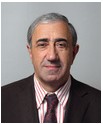资讯内容 Content
[EuroPCR 2011]Interview with David G. Iosseliani
国际循环网版权所有,谢绝任何形式转载,侵犯版权者必予法律追究。
 Professor David G. Iosseliani
Professor David G. Iosseliani
Director of the Moscow City Centre of Interventional Cardioangiology,
Head of the Russian Scientific Society of Interventional cardioangiology (RSICA)
Perhaps you could start by telling us about what brought you to interventional cardiology?
It is rather hard to explain in just a few words how and why I decided to dedicate my efforts to interventional cardiology about 30 years ago. However, there is one thing I can say for sure – my choice was not a mistake. The 21st century, at least its first half, will be an era of endovascular medicine, not only in cardiology and angiology, but in many fields.
Could you describe the Society of Interventional Cardioangiology (RSICA) to us?
The RSICA was founded in 1999 and was one of the first societies of its kind in the world. I am proud to say that I was its founder. During the following years, the Society did a lot for the development of interventional cardiology in Russia. This speciality has developed rather slowly in Russia and has not received due extension until now (at present we perform about 400 PCI per one million people every year). Speaking about the activities of the RSICA, I would like to mention that we have held four All-Russian congresses with the participation of numerous eminent world cardiologists. We are pleased to say that at present, we have a close collaboration with such international forums as PCR and TCT. Being Vice-President of the RSICA and in charge of international relations, I am doing my best to enlarge this collaboration.
Who is the current President and until when will he be in this position?
Current President of our Society – Professor Leonid Kokov, MD, Corresponding Member of Russian Academy of Medical Sciences, Head of Chair of X-ray Diagnostics at the 1st Moscow Medical University named after Sechenov – was elected in March 2011, during the 4th All-Russian Congress of Interventional Cardioangiology and will be in this position until March 2014.
How has the situation in Moscow evolved for patients over the last year?
I can say that every year we see quantitative and qualitative improvements in PCI procedures performed. Unfortunately, we still have not solved the problem of procedure expectations – in some cases the waiting list extends to 1-2 months. However, the situation in terms of the treatment of patients with AMI, is undergoing significant changes in Russia and, in particular, in the city of Moscow. The use of pre-hospital thrombolysis and endovascular myocardial reperfusion is spreading more widely. As a result, about 35% of patients receive pharmacological or endovascular myocardial reperfusion after AMI.
Could you tell us about the exchanges between the RSICA and the PCR family – has this collaboration been positive and in what ways?
We aspire for close collaborations with EuroPCR. During the last several years we have noted some significant advances in this field. Our Working Group participates more and more actively in the work of EuroPCR; for example, last year we had a live case broadcasting from our cathlab where we presented three cases of AMI. In March 2011, we held two sessions of EuroPCR in Moscow, during the 4th All-Russian Congress of Interventional Cardioangiology.
What have been the highlights over the last year for you?
We have introduced into our practice simultaneous procedures of ASD closure and coronary stenting in adults. We consider these procedures as an upcoming trend in interventional cardiology.
How would you envisage this partnership between your working group & EuroPCT in the future years, i.e. your vision for the future?
I consider EuroPCR to be the most effective among all the forums in our field and I hope that it will continue to develop and evolve in the future. Certainly, all of us must apply their efforts to support this development. I expect that in the future not only the Eastern European countries, but also Russia and former Soviet republics will enjoy larger involvement in PCR activities. Also EuroPCR related events, similar to, for example, AsiaPCR/SingLIVE, will extend their geography. I would like to mention an outstanding role of Professor Jean Marco in the success of EuroPCR. We are grateful to him and we hope for a close collaboration with him in the years to come.
选自《EuroPCR每日新闻》